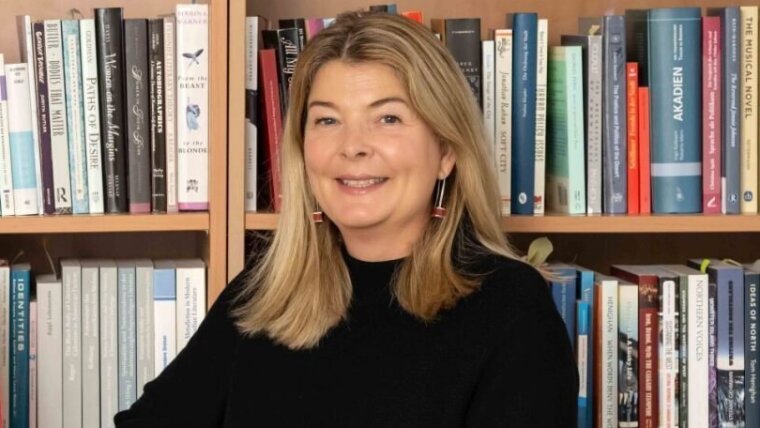
As the relationship between humankind and nature continues to be portrayed in art and culture, it is emerging as a research topic in the humanities. So, it comes as no surprise that the humanities are also being incorporated into the work of the Thuringian Water Innovation Cluster »ThWIC«. Professor of North American Studies, Caroline Rosenthal, explores how the topic of water is reflected in North American literature and how it can shape, define, and change entire regions.
By Sebastian Hollstein
»Water is the principle of all things, for all things are from water and all things are resolved into water«. This wisdom, articulated by ancient philosopher Thales of Miletus, has formed the foundation of science and art for millennia. The fundamental concepts of life and death have found symbolic expression in liquid form for thousands of years, whether as an indomitable, divine act of nature as in the floods portrayed in the Epic of Gilgamesh or the Genesis flood narrative, mythological beings such as mermaids and mermen, or as the living cosmos depicted in the film »Avatar: The Way of Water«. In works of literature, rivers are the perfect metaphor for the meandering course of life, while the seemingly endless nature of the oceans opens up a reflective landscape and a world of possibilities for literary heroes and heroines as well as readers themselves.
However, in recent decades various literary movements have emerged that no longer use water – and nature in general – as a mere backdrop or stylistic device, but rather specifically address its importance along with a growing number of ecological issues. »Art and literature are important and powerful in identifying problems and mediating them to society,« Prof. Caroline Rosenthal states. »Narratives often speak louder than mere statistics«.
Viewing nature with a political eye
For several years now, Caroline Rosenthal has been studying how the Anthropocene – the geological epoch shaped by humans – is reflected in North American literature. »In the 19th century, nature writing emerged as a Romantic literary genre, especially in Great Britain and the USA, in which authors focused on the experience of landscape, flora and fauna. This encounter often also has had a political dimension, for example with regard to the national identity of the United States where vast landscapes and seemingly untouched nature conveyed a sense of grandeur and freedom.«
In this way, literature acts as a seismograph of society, foreseeing and preserving the ecological discussions of our time. As pollution, extinction, and climate change continue to threaten our existence, various movements such as ecocriticism, which emerged in the USA in the 1970s, provide a critical platform for people to question the relationship between humankind and nature. Among other things, the proponents of this approach demand that humanity sees itself as part of the ecosystem as well as its steward. Literature plays a crucial part in raising awareness and in highlighting dangers but also in presenting possible future scenarios which instigate change and directly impact society.
Regional identities are defined by water
This school of thought is increasingly percolating through to literary studies – and Jena is no exception. Caroline Rosenthal's professorship of American Studies accommodates a group of doctoral candidates who are dealing with various ecocritical topics and have formed an »Ecocriticism Research Collective«.
In addition, a team of American Studies experts from the University of Jena is working on a ThWIC sub-project to investigate how water and bodies of water help to shape regional identity. The aim of the project is to develop a hydro-regionalism model based on the concept of bioregionalism that emerged in California in the 1970s, according to which regions are defined by geological and geographical factors as well as cultural practices as opposed to political borders. Some of the most important components of bioregionalism are watersheds, mountain ranges, and collective storytelling traditions. »We believe that water – in all its forms – can also assume such a function in creating a sense of unity within a specific region,« says Caroline Rosenthal. »This applies both to the knowledge of water passed down through generations within a region and to symbolic attributions such as myths and legends that have survived in various forms to this day«.
In order to design the model using an exemplary region on the North West Coast of Canada, the literary scholars are first investigating fictional and non-fictional sources which constitute a local archive about water. Where does the region's water originate? Where does it flow? What are the region's precipitation cycles? How is the water quality? What relationship do the locals have to individual bodies of water? What stories and symbols have been inspired by water? The answers to these questions can be found by analysing texts and ascertaining the importance and function of water for the region. In this way, the researchers can learn more about the region's cultural traditions – and can even potentially discover how water defines regional identity in a way that raises environmental awareness and promotes behavioural change.
Literature as a realm of possibility for dealing with water
»We want to examine literature as a hypothetical space of possibility which allows us to imagine a variety of future scenarios for the usage of water as a material and cultural resource«, Caroline Rosenthal explains. »People who identify with the water around them are more protective of it,« she adds.